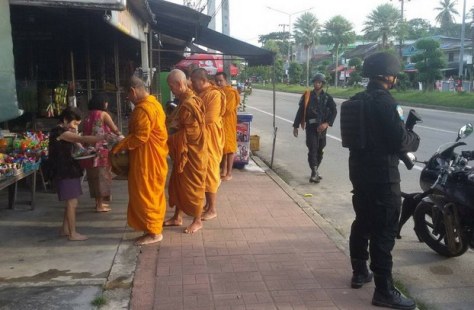Giles Ji Ungpakorn
Following news of the fatal shooting of Buddhist monks at Wat Rattananupab in Su Ngai Padi district of Naratiwat, the reactionary Buddhist nationalists in Thai society have been up in arms. These people are not interested in seriously analysing the causes of violence in Patani. The Thai military has also used the event to be even more strident in its attitude to those opposing the Thai state.

Yet, in Patani, ever since it was partitioned between Thailand and the British Empire, there has been an on-going war between the Thai state and those who want independence. The violence associated with this war is a direct result of the oppression of Malay Muslims by the Thai state. Patani is occupied by Thai soldiers like a colony. [For further reading see https://bit.ly/2bemah3 ].

The actions of the Thai military are a serious cause for the continued violence. The military’s extreme nationalism means that since the military coup of 2014, so-called peace talks have stalled. The Thai military is not really interested in solving the problems that have led to the on-going war. It is only interested in talks as a means to get the independence fighters to surrender.

When considering the tragic events at Wat Rattananupab, one of the worst aspects is the reaction by Thai NGOs and Human Rights Watch. A long list of Thai NGOs was attached to a declaration condemning the events and calling on the Thai state to bring the perpetrators to justice. Human Rights Watch called the independence fighters “war criminals”. In effect, this means that the NGOs have publicly sided with the Thai state in the war because they see the military as having legitimacy to “bring the perpetrators to justice”. None of this is very surprising since many Thai NGOs welcomed the recent military intervention in Thai politics to overthrow democratically elected governments. [See https://bit.ly/1UpZbhh ].
What has often been missing from declarations of outrage is the fact that 3 Muslim clerics were murdered a few months before the events at Wat Rattananupab and that an assassination attempt was made against another cleric in January. Thai army death squads are known to target Muslim clerics and activists, who they claim are part of the separatist struggle. Those who cannot be found guilty in open law courts are often “eliminated”. In addition to this a leader of the separatist BRN was recently killed by a Thai army death squad in Naratiwat.

Luckily, among the nationalist rants and the stupidity of the NGOs, there have been some voices of reason. Two recent articles sought to provide a more balanced understanding of events. Surapot Taweesak wrote that Buddhist monks have been closely connected to the Thai state for a long time. In Patani the military have a history of getting soldiers to become monks and some carry weapons. Soldiers are also stationed in temples and walk beside monks when they beg for food in the mornings. It is therefore not surprising that the Buddhist establishment is viewed as part of the Thai state. Surapot is a respected scholar of Buddhism and has long been an advocate of the separation of religion from the Thai state. [See https://bit.ly/2RRkMG3 ].

Assistant Professor Channarong Boonnoon from Silapakorn University wrote that those who are enraged by the shooting of monks, and raise questions like “why kill monks?”, are seldom interested in the answer. He explained that despite many individual monks being innocent, the Buddhist Establishment has never distanced itself from those in power and never criticised any wrong-doing by the state. He also confirmed that Buddhist monks in Patani have a history of being close to the military. [See https://bit.ly/2WryRIX ].

After the temple shootings, Thai army rangers took the opportunity to raid a Malay Muslim “Pondok” religious school in Patani. They arrested a number of young men. One was photographed covered in a net like a hunted animal. The military claim that these men were carrying out “unarmed combat training” and that some were illegal Cambodian migrants. Local villagers dispute the military’s story. They believe that the young men, some of whom seem to be under 18 years of age, were just exercising after a long day of studying. The fact that all but the Cambodians were later released, shows that there was no evidence that any combat training took place. The Cambodians were detained on immigration charges and deported.

It is worth noting that many Muslim Cambodian citizens are ethnic Chams. The Chams originally had an empire in southern Vietnam and Cambodia. For hundreds of years they have travelled to and sometimes settled in Malaysia, Indonesia and Patani. In modern times they are drawn to Patani because of their common Malay language and their religion and the fact that Patani Pondoks are highly regarded. It is also worth remembering that Cambodian and Burmese migrants are the favourite scapegoats of Thai nationalists and the Thai military has a history of harassing people in religious schools.

Those who are genuinely interested in building peace in Patani know that for there to be peace there has to be justice for the local Malay Muslim population. Locals of all religions and cultures who are living in Patani have the right to collectively determine their future and they have the right to separate from the Thai state if they so decide. But this cannot happen when religion is not separated from the state and the military continue to control the future of Patani.
Unfortunately, the Thai political parties who are now canvassing for votes are reluctant to propose radical progressive solutions to the war.
Other articles on Patani can be read here: https://bit.ly/2HHTwVN , https://bit.ly/2UqtRCc , https://bit.ly/1QCoOWs , https://bit.ly/2tZG5JK , https://bit.ly/1RmdMZs , https://bit.ly/2eBAzDj and https://bit.ly/2bemah3 .
See also, this report: https://bit.ly/2S2qx3N





































